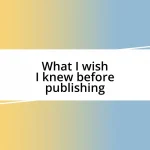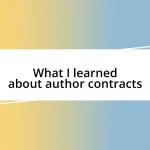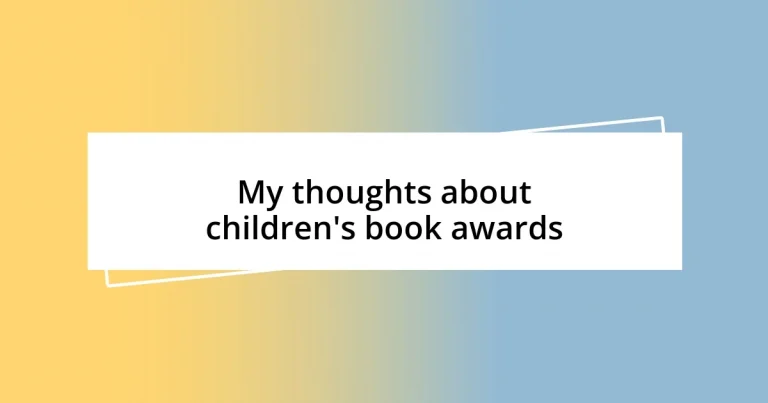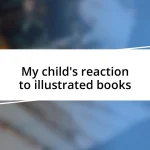Key takeaways:
- Children’s book awards highlight quality literature and guide families and educators in selecting impactful reading materials.
- Major awards like the Caldecott and Newbery Medals recognize storytelling excellence and promote discussions around important themes, fostering community engagement.
- Current trends show a focus on inclusivity, diversity, and relevant themes like environmental awareness, reflecting societal changes in children’s literature.
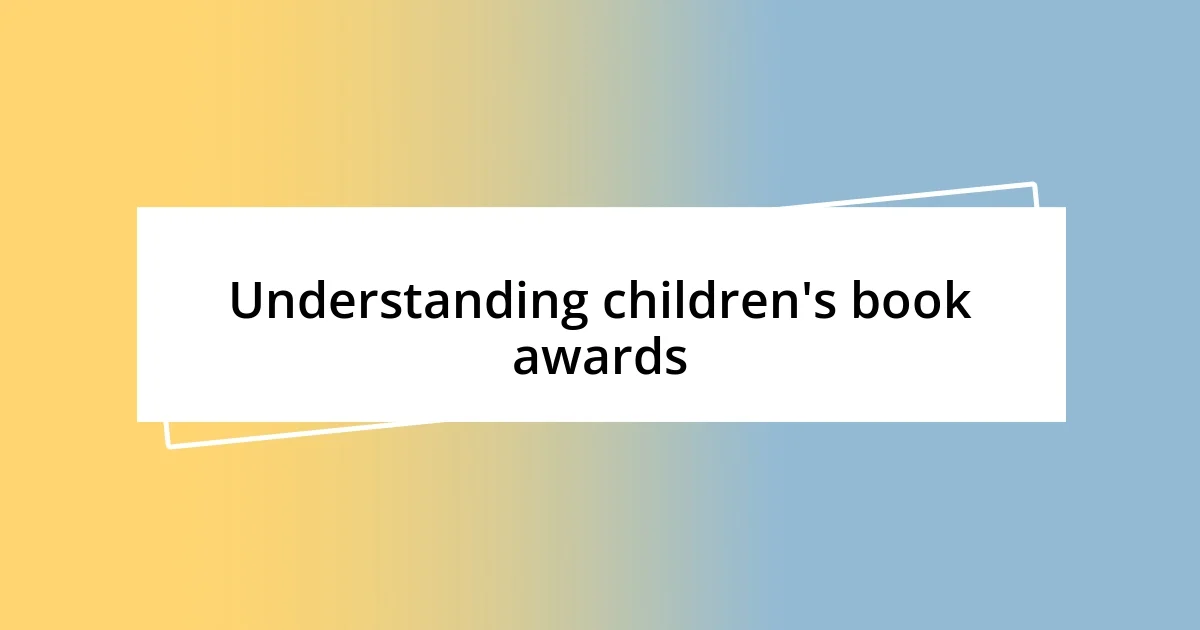
Understanding children’s book awards
Children’s book awards play a pivotal role in highlighting outstanding literature that captures the hearts of young readers. I remember the excitement I felt as a child when a book I’d loved won a prestigious award. It made me feel connected to the stories, as if the world was recognizing the magic I found within those pages.
These awards not only celebrate the creativity of authors and illustrators but also guide parents, educators, and children towards quality reading material. Have you ever found yourself wandering through a bookstore, unsure of what to pick? That’s where the power of awards comes in; they serve as trusted signposts, helping to navigate the vast sea of children’s literature.
In my experience, awards can spark discussions about the themes and messages in the stories. It’s fascinating how a simple sticker or mention can elevate a book’s impact, prompting conversations in families or classrooms about important issues like diversity or resilience. Isn’t it remarkable to think how these accolades can inspire young minds to dream big?
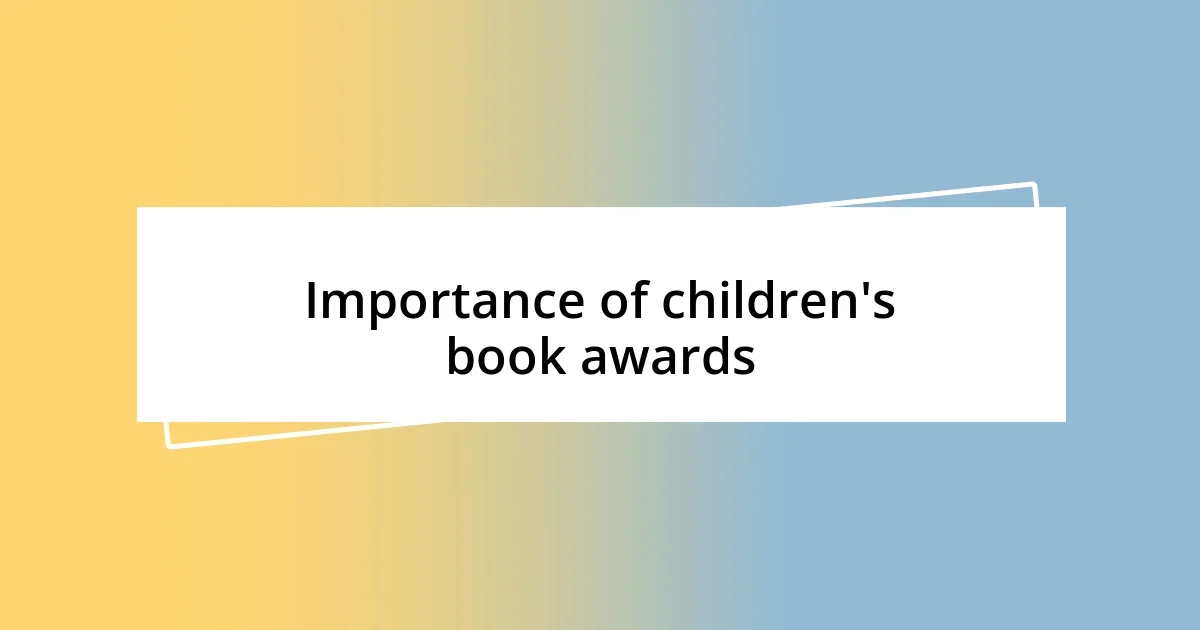
Importance of children’s book awards
Children’s book awards serve not just to recognize literary excellence but to create cultural touchstones for young readers. When I was a kid, finding a book with a shiny sticker indicating it had won an award often made my choice feel special. It was like being part of a community that valued stories, offering an unspoken assurance that I was about to enter a world worth exploring.
Moreover, these awards provide an essential framework for educators and parents to curate reading lists. I remember a particularly busy week when I needed gift ideas for my niece’s birthday. It was a game-changer to reference award-winning titles, ensuring I chose books that would not only entertain but also educate her. This shared knowledge offers a sense of security in our choices, knowing we are choosing stories that have been thoughtfully vetted.
Additionally, these accolades foster engagement and discussion surrounding literature’s important themes. I think back to hosting a storytelling night with friends, where we realized how much we could learn from books that won awards focused on social issues. This communal exploration deepened our understanding and appreciation of literature’s role in shaping values and perspectives—something I believe can profoundly impact the development of young readers.
| Aspect | Impact of Children’s Book Awards |
|---|---|
| Acknowledgment | Highlights quality and creativity in children’s literature. |
| Guidance | Helps parents and educators find exceptional reading choices. |
| Engagement | Encourages discussion about relevant themes and ideas. |
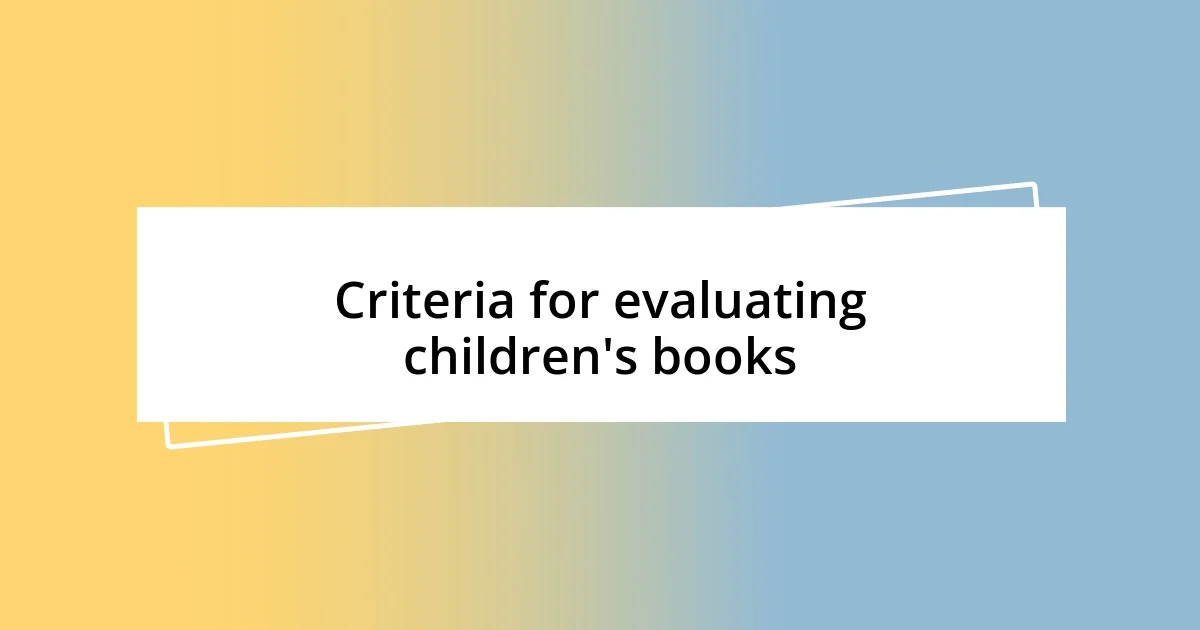
Criteria for evaluating children’s books
Evaluating children’s books involves several essential criteria that can help us determine their quality and impact. From my perspective, it’s important to consider how well the story resonates with young readers. I remember reading a book that took me on an adventure I didn’t want to end; those moments of connection are what we should look for in children’s literature.
Key criteria for evaluating children’s books include:
- Storyline: Does the plot engage young imaginations and hold attention throughout?
- Character Development: Are the characters relatable, diverse, and well-developed, enabling children to see themselves in the stories?
- Illustrations: Do the visuals complement the text and enhance the storytelling experience?
- Themes: Are the themes age-appropriate, meaningful, and capable of sparking curiosity or discussion?
- Language: Is the language accessible yet rich enough to challenge and expand young readers’ vocabularies?
In my experience, I’ve found that the best children’s books are those that not only entertain but also teach valuable lessons about empathy, kindness, and resilience. On one occasion, I stumbled upon a book that beautifully illustrated the journey of a young girl overcoming obstacles; I still vividly recall how it inspired me to embrace my own challenges. The emotional depth and relatable conflicts are what I believe truly resonate with kids, allowing them to internalize essential life lessons.
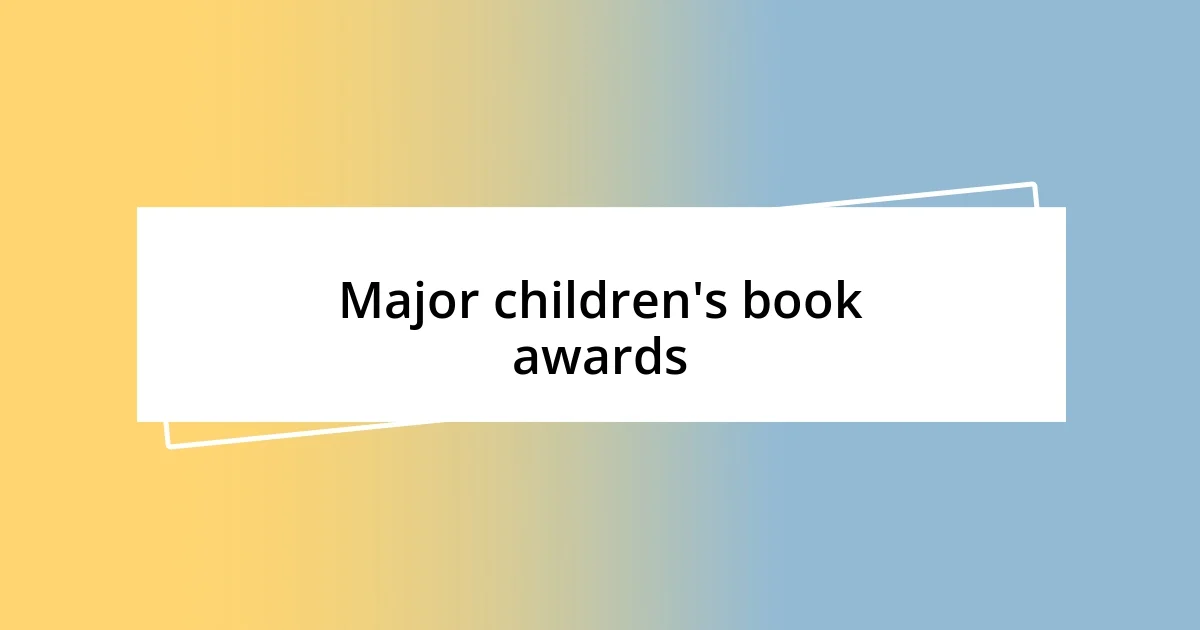
Major children’s book awards
Children’s book awards are often seen as the gold standard in literature for young audiences. Take the Caldecott Medal, for instance—I remember eagerly turning the pages of a Caldecott-winning book as a child, captivated not just by the story but by the stunning illustrations that made the tale come alive. It’s like holding a small piece of magic in your hands, and I believe that awards like this draw attention to the artistry that includes both text and images, creating a holistic reading experience.
Another prestigious award is the Newbery Medal, which I often consider a beacon for excellent storytelling. Reflecting back on my own reading journey, I can’t help but appreciate how Newbery winners seem to intertwine unforgettable characters with profound life lessons. When I picked up a Newbery winner as a gift for my younger brother, I felt a rush of excitement knowing he would dive into a world meticulously crafted by a skilled author, soaking up themes that would enhance his understanding of the world.
Then there’s the Coretta Scott King Award, which celebrates African American authors and illustrators. This award resonates with me deeply because it honors voices that have often been overshadowed. I clearly remember reading a book that won this award and feeling a sense of connection and empowerment through its characters’ stories. It sparked discussions among my friends, prompting us to explore cultural backgrounds and experiences we hadn’t encountered before. Isn’t it amazing how literature can foster such important conversations?
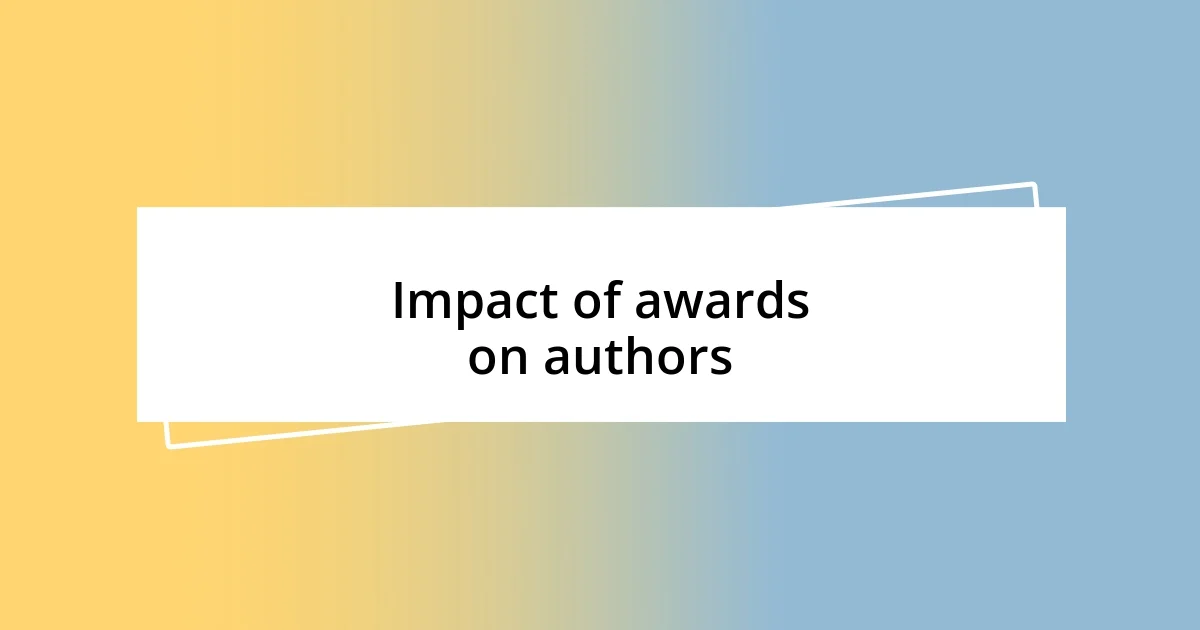
Impact of awards on authors
The impact of awards on authors can be profound, opening doors to new opportunities. When I consider my favorite authors, many have shared how a significant award transformed their careers. It’s fascinating to think that an accolade not only validates their hard work but can catapult their visibility in a competitive market.
Winning a prestigious award often leads to increased book sales and more invitations for public appearances. I recall an author I follow who won the Pura Belpré Award; their social media was flooded with congratulatory messages, and shortly after, I noticed their book climbing the bestseller list. It’s like a chain reaction—recognition elevates their status, leading to greater appreciation of their work.
Moreover, there’s a personal dimension to the impact of awards. Some authors express how receiving an award gave them the confidence to continue writing. I remember reading an interview with an author who mentioned that, after winning a national award, they felt a renewed sense of purpose in their storytelling. Isn’t it remarkable how recognition can ignite one’s passion and drive? For many authors, awards serve as a crucial affirmation that their stories matter, motivating them to reach even higher in their craft.
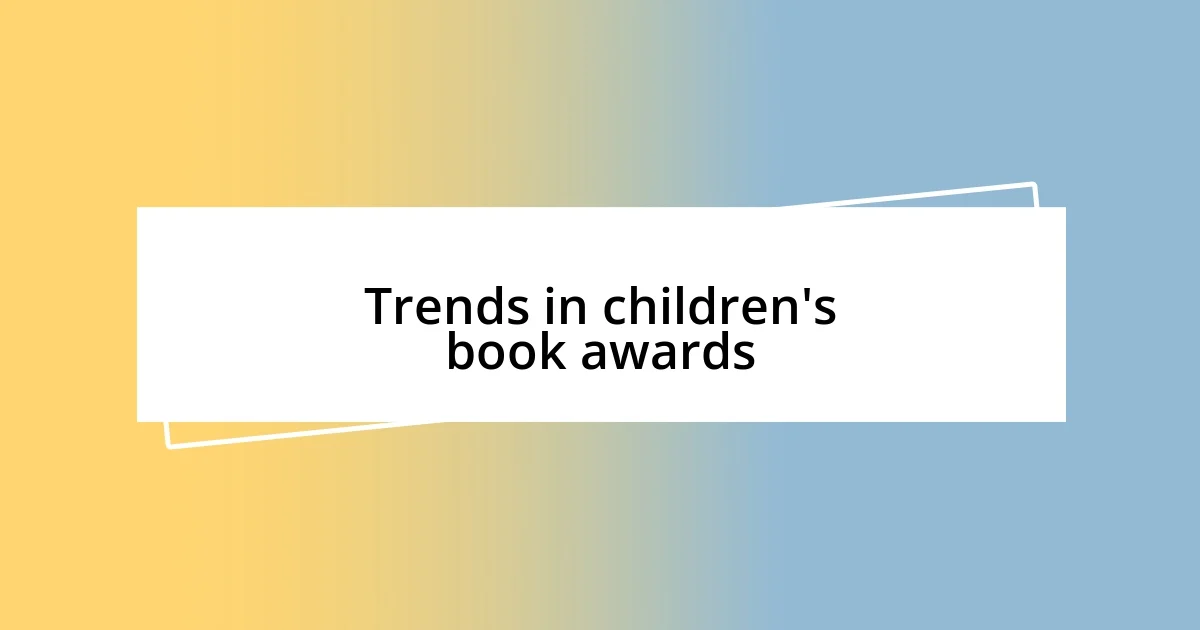
Trends in children’s book awards
The landscape of children’s book awards is evolving, reflecting broader societal changes. I’ve noticed a significant push towards inclusivity and diversity in recent years, with awards recognizing a more varied range of voices and stories. It warms my heart to see authors from different backgrounds celebrated, as it opens up a world of literature that resonates with children from all walks of life. Don’t you think it’s vital for young readers to see themselves reflected in the stories they explore?
Additionally, there’s a rise in awards that focus on specific themes, like environmental awareness or mental health. A few months back, I stumbled upon an award dedicated entirely to recognizing books that promote empathy and kindness. I felt a spark of hope as I considered how these themes can shape children’s understanding of the world around them. When I was younger, I often gravitated toward stories that taught me about compassion, and witnessing a similar trend today excites me about our future readers and their potential to be change-makers.
Moreover, digital initiatives and online platforms are now playing a crucial role in the nomination and voting processes for some awards. It’s interesting to see how technology is enhancing accessibility and engagement in the literary community. I recently participated in an online voting campaign for a children’s book award, and it felt empowering to have a say in which stories resonate most with young readers today. Isn’t it intriguing to think how this shift could shape the future of children’s literature?

How to choose award-winning books
Choosing award-winning children’s books can be incredibly rewarding, but I believe there are a few key strategies to help you navigate this landscape. First, look for books that have won prestigious awards like the Caldecott or Newbery Medals. I remember when I sought out Newbery winners for my niece, and I discovered narratives that not only entertained her but also sparked rich conversations between us about the themes woven into the stories. It was a joy to see her engrossed in the characters and lessons!
Another approach is to consider the book’s themes and how they resonate with your child. When I browse through award lists, I often ask myself, “What messages do I want to share?” I recall finding a beautifully illustrated book that addressed friendship and empathy, and the joy on my child’s face while reading it together was priceless. Those moments are precious, and they reinforce the importance of selecting stories that contribute positively to a child’s development.
Lastly, exploring reviews and recommendations from fellow readers can guide your selections. I often chat with friends who are educators or parents, and their insights have led me to some hidden gems. Just last month, one of them mentioned a lesser-known award winner that beautifully tackled themes of resilience. Have you ever felt the thrill of discovering a book that exceeds your expectations? That’s what makes the process so enriching!





